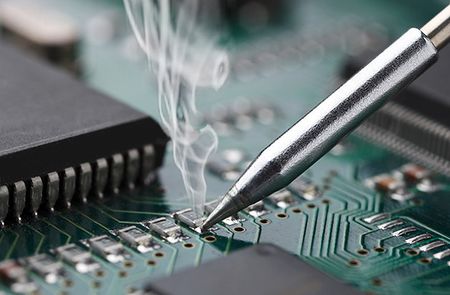Difference between revisions of "Soldering Irons"
Jump to navigation
Jump to search
| Line 3: | Line 3: | ||
'''Soldering''', is a process in which two or more items (usually metal) are joined together by melting and putting a filler metal (solder) into the joint, the filler metal having a lower melting point than the adjoining metal. Soldering differs from [[welding]] in that soldering does not involve melting the work pieces. In [[brazing]], the filler metal melts at a higher temperature, but the work piece metal does not melt. In the past, nearly all solders contained lead, but environmental and health concerns have increasingly dictated use of lead-free solder for electronics and plumbing purposes. | '''Soldering''', is a process in which two or more items (usually metal) are joined together by melting and putting a filler metal (solder) into the joint, the filler metal having a lower melting point than the adjoining metal. Soldering differs from [[welding]] in that soldering does not involve melting the work pieces. In [[brazing]], the filler metal melts at a higher temperature, but the work piece metal does not melt. In the past, nearly all solders contained lead, but environmental and health concerns have increasingly dictated use of lead-free solder for electronics and plumbing purposes. | ||
| − | == Soldering Irons == | + | == Maker Hub Soldering Irons == |
| − | [[Weller WES51]] | + | * [[Weller WES51]] |
| + | * [[Metcal MX-5211]] | ||
== Applications == | == Applications == | ||
| Line 10: | Line 11: | ||
== Solders == | == Solders == | ||
| − | + | There are different types of solder available in the [[Maker Hub]]. | |
| − | == | + | == Training == |
| − | |||
| − | |||
| − | |||
| − | |||
| − | |||
| − | |||
[[Category:Soldering Iron]] | [[Category:Soldering Iron]] | ||
Revision as of 22:08, 18 February 2018
Soldering, is a process in which two or more items (usually metal) are joined together by melting and putting a filler metal (solder) into the joint, the filler metal having a lower melting point than the adjoining metal. Soldering differs from welding in that soldering does not involve melting the work pieces. In brazing, the filler metal melts at a higher temperature, but the work piece metal does not melt. In the past, nearly all solders contained lead, but environmental and health concerns have increasingly dictated use of lead-free solder for electronics and plumbing purposes.
Maker Hub Soldering Irons
Applications
Soldering is used in plumbing, electronics, and metalwork from flashing jewelry.
Solders
There are different types of solder available in the Maker Hub.
